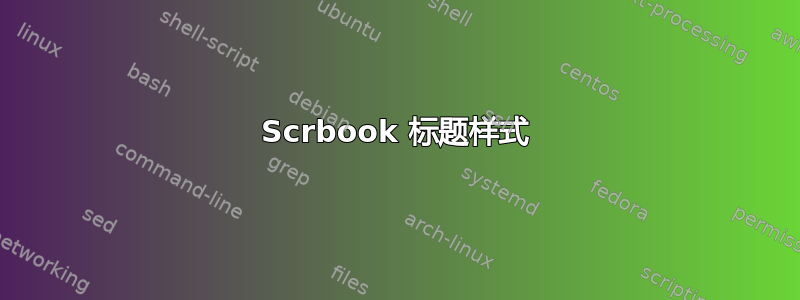
我正在尝试简化 -class 的标题样式scrbook以用于我的论文,但无法找到一种方法来阻止标题被下划线和章节被数字标记。这是我使用的 class-specification:
\documentclass[
12pt,
a4paper,
oneside,
headinclude,
footinclude,
headnosepline,
BCOR5mm,
]{scrbook}
下面是当前输出的示例。我本质上想要实现的是删除章节标题下方的行和右侧的数字。

任何关于此事的想法都将不胜感激。
添加的 MWE:
主文本
\documentclass[
12pt,
a4paper,
oneside,
headinclude,
footinclude,
headnosepline,
BCOR5mm,
]{scrbook}
\input{structure.tex}
\hyphenation{Fortran hy-phen-ation}
\begin{document}
\makeatletter
\begin{titlepage}
\pagenumbering{gobble}
\thispagestyle{empty}
\title{Title}
\author{Author}
\date{Spring \the\year}
\end{titlepage}
\makeatother
\newpage\pagestyle{scrheadings}\pagenumbering{Roman}
\chapter*{Contents}\singlespacing
\tableofcontents
\onehalfspacing
\pagestyle{plain}
\newpage\chapter{Introduction} \label{part:Introduction}
\end{document}
结构.tex
\usepackage[parts,beramono,eulermath,pdfspacing,dottedtoc]{classicthesis}
\usepackage[english]{babel}
\usepackage[round, longnamesfirst]{natbib}
\setcitestyle{aysep={}}
\bibliographystyle{plainnat}
\setcitestyle{notesep={: }}
\setlength{\parindent}{0em}
\setlength{\parskip}{1em}
\renewcommand{\baselinestretch}{1.3}
\usepackage{titlesec}
\titlespacing\section{0pt}{12pt plus 4pt minus 2pt}{0pt plus 2pt minus 2pt}
\titlespacing\subsection{0pt}{12pt plus 4pt minus 2pt}{0pt plus 2pt minus 2pt}
\titlespacing\subsubsection{0pt}{12pt plus 4pt minus 2pt}{0pt plus 2pt minus 2pt}
\titlespacing*{\paragraph} {0pt}{3.25ex plus 1ex minus .2ex}{1em}
\titlespacing*{\subparagraph} {\parindent}{3.25ex plus 1ex minus .2ex}{1em}
\usepackage{geometry}
\usepackage[T1]{fontenc}
\usepackage[utf8]{inputenc}
\usepackage{graphicx}
\usepackage{tikz}
\usetikzlibrary{arrows}
\usepackage{grffile}
\usepackage{pgfplots}
\usepackage{gnuplottex}%[miktex]%[shell]
\usepackage{pgfplotstable}
\pgfplotstableset{col sep = comma}
\pgfplotsset{width=\textwidth,compat=1.9}
\usetikzlibrary{pgfplots.groupplots}
\usepackage{filecontents}
\graphicspath{{Figures/}}
\usepackage{enumitem}
\usepackage{subfig}
\usepackage{amsmath,amssymb,amsthm}
\makeatletter
\def\thmhead@plain#1#2#3{%
\thmname{#1}\thmnumber{\@ifnotempty{#1}{ }\@upn{#2}}%
\thmnote{: {\the\thm@notefont#3}}}
\let\thmhead\thmhead@plain
\makeatother
\usepackage{varioref}
\usepackage{times}
\usepackage{chngpage}
\usepackage{tabulary}
\usepackage{rotating}
\usepackage{tabularx}
\usepackage{placeins}
\usepackage{float}
\usepackage{floatpag}
\usepackage{booktabs}
\usepackage{multirow}
\usepackage{caption}
\usepackage{setspace}
\usepackage[flushleft]{threeparttable}
\usepackage[normalem]{ulem}
\newcommand{\msout}[1]{\text{\sout{\ensuremath{#1}}}}
\usepackage{chronology}
\usepackage{easy-todo}
\input{PgfplotNan.tex}
\usepackage{titletoc}
\makeatletter
\renewcommand\tableofcontents{%
\@starttoc{toc}%
}
\makeatother
\usepackage{setspace}
\setcounter{secnumdepth}{2}
\setcounter{tocdepth}{2}
\usepackage{amsfonts}
\usepackage{datagloss}
\selectcolormodel{gray}
\newenvironment{blockquote}{%
\par%
\em
\medskip
\leftskip=4em\rightskip=2em%
\noindent\ignorespaces}{%
\par\medskip}
\makeatletter
\pgfplotsset{
every axis x label/.append style={
alias=current axis xlabel
},
legend pos/outer south/.style={
/pgfplots/legend style={
at={%
(%
\@ifundefined{pgf@sh@ns@current axis xlabel}%
{xticklabel cs:0.5}%
{current axis xlabel.south}%
)%
},
anchor=north
}
}
}
\makeatother
\newlength\figureheight
\newlength\figurewidth
\pgfplotscreateplotcyclelist{black-white-mark}{%
solid, every mark/.append style={solid, fill=gray}, mark=*\\%
dotted, every mark/.append style={solid, fill=gray}, mark=square*\\%
densely dotted, every mark/.append style={solid, fill=gray}, mark=otimes*\\%
loosely dotted, every mark/.append style={solid, fill=gray}, mark=triangle*\\%
dashed, every mark/.append style={solid, fill=gray},mark=diamond*\\%
loosely dashed, every mark/.append style={solid, fill=gray},mark=*\\%
densely dashed, every mark/.append style={solid, fill=gray},mark=square*\\%
dashdotted, every mark/.append style={solid, fill=gray},mark=otimes*\\%
dasdotdotted, every mark/.append style={solid},mark=star\\%
densely dashdotted,every mark/.append style={solid, fill=gray},mark=diamond*\\%
}
\pgfplotscreateplotcyclelist{black-white-nomark}{%
solid\\%
dotted\\%
densely dotted\\%
loosely dotted\\%
dashed\\%
loosely dashed\\%
densely dashed\\%
dashdotted\\%
dasdotdotted\\%
densely dashdotted\\%
}
\newcommand{\chartstyle}{
/pgf/number format/.cd,
use comma,
1000 sep={},
ymajorgrids=true,
grid style=dashed,
% legend style={at={(0,0)}, anchor=north east, align=left}, % Lower left corner
legend pos=outer south, % Below
% legend pos=north east, % Top right corner
cycle list name=black-white-nomark,
}
\newcommand{\nochartstyle}{
/pgf/number format/.cd,
use comma,
1000 sep={},
ymajorgrids=false,
grid style=dashed,
% legend style={at={(0,0)}, anchor=north east, align=left}, % Lower left corner
legend pos=outer south, % Below
% legend pos=north east, % Top right corner
cycle list name=black-white-nomark,
xlabel={},
xticklabels={,,}
ylabel={},
yticklabels={,,},
axis y line*=left,
scaled y ticks = false
}
\theoremstyle{definition}
\newtheorem{definition}{Definition}
\theoremstyle{plain}
\newtheorem{theorem}{Theorem}
\theoremstyle{remark}
\newtheorem*{remark}{Remark}
\theoremstyle{plain}
\newtheorem{hyp}{Hypothesis}
\newtheorem{subhyp}{Hypothesis}[hyp]
\hypersetup{
colorlinks=true, breaklinks=true, bookmarks=true,bookmarksnumbered,
urlcolor=black, linkcolor=black, citecolor=black,
pdftitle={},
pdfauthor={\textcopyright},
pdfsubject={},
pdfkeywords={},
pdfcreator={pdfLaTeX},
pdfproducer={LaTeX with hyperref and ClassicThesis}
}
答案1
根据对问题的评论,删除titlesec和classicthesis包解决了问题。回想起来,建议尽早选择一个完整的类,比如建议的 KOMA 脚本,因为这将节省最终产品的时间——而不是一路拼凑解决方案。
事实上,在编写和重写内容以及已经到位的格式时,我没有时间切换课程,所以我采用了建议的解决方案;并且它产生了可接受的最终产品。


